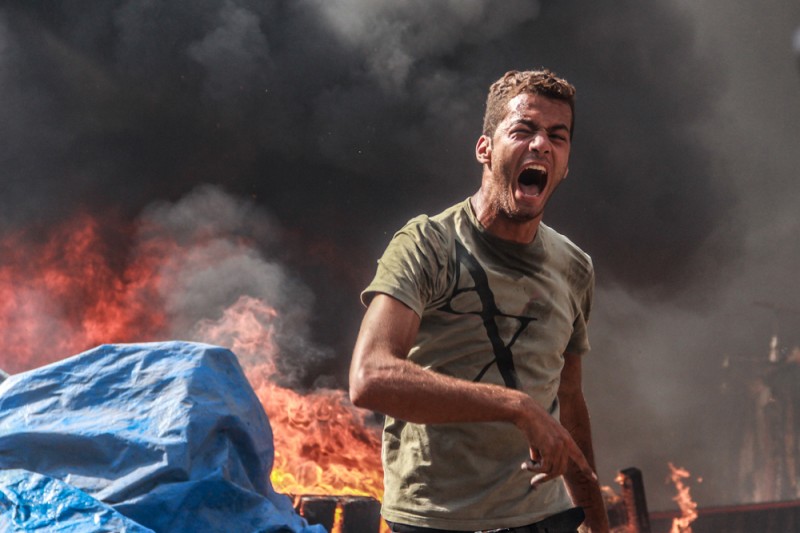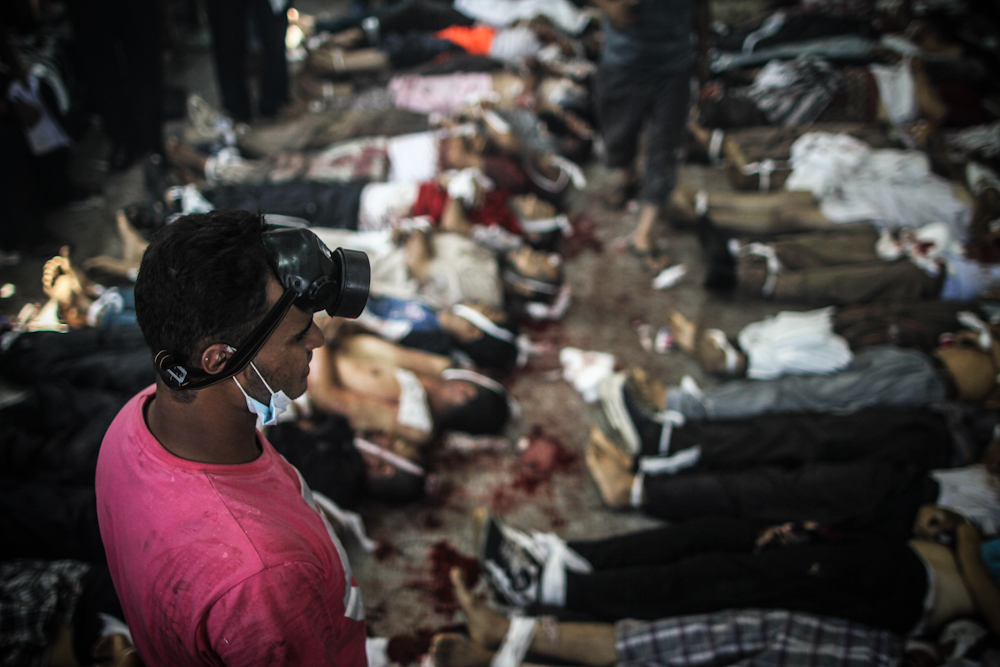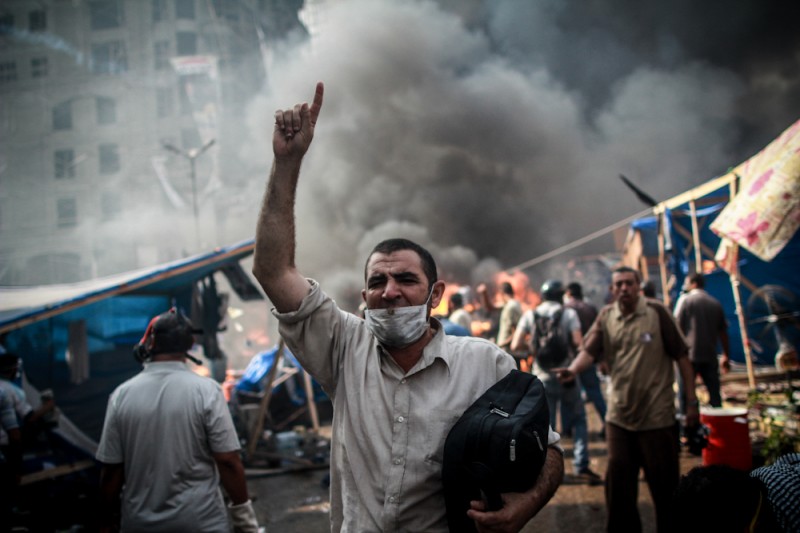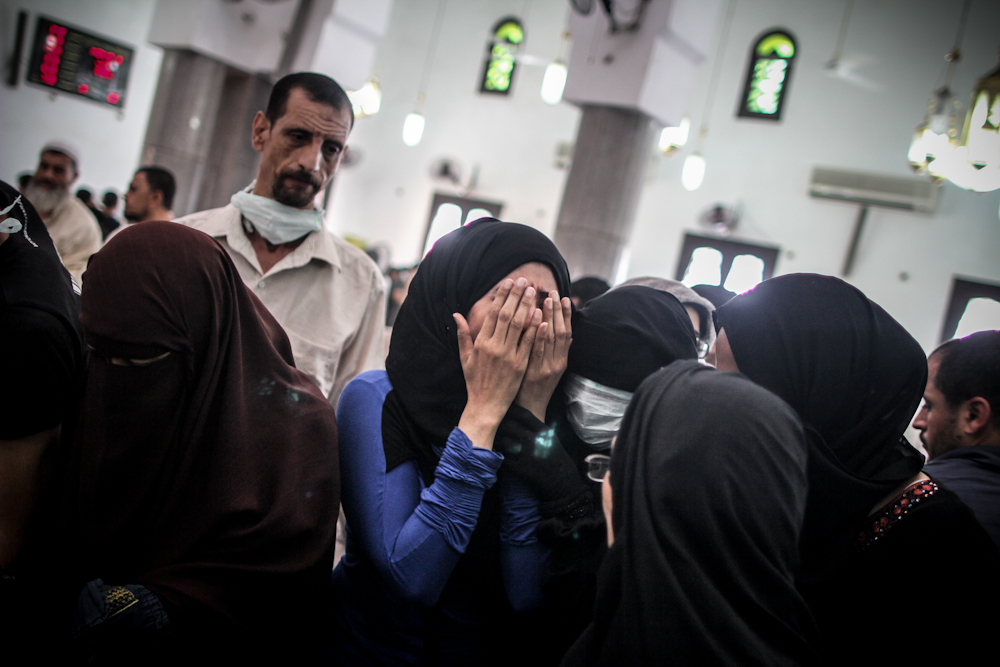
A young Egyptian flees from the horror of the Rabaa Massacre. By Mosa'ab Elshamy. From his Flickr Account. Taken on August 14, 2013. Used with Permission.
One year ago today, the world watched in horror as one the single bloodiest days in modern protest history took place in Cairo, Egypt.
On August 14, 2013 Egyptian security forces opened fire at a sit-in protest in Rabaa Al Adawiya Square, killing more than 800 people opposed to the ousting of Egypt's first democratically-elected president Mohamed Morsi.
A few weeks earlier the reign of Morsi, a senior Muslim Brotherhood member, was cut short after only one year in power. Morsi's ouster was announced on July 3 2013 by the head of the Egyptian Armed Forces Abdel Fattah El Sisi, who later became the president of Egypt.
Al Jazeera Plus shared this 23-second video, featuring photographs taken by Award-winning Egyptian photojournalist Mosaab Elshamy touching on the scale of the catastrophe.
Elshamy shares an extensive gallery of photographs from the Rabaa massacre and its aftermath on Flickr. [Warning: Some pictures, particularly of corpses in the morgue, are graphic]. His gallery of 184 photographs have had almost 363K views to-date.

Raba'a's victims. By Mosa'ab Elshamy. From his Flickr Account. Taken on August 14, 2013. Used with Permission.
In a series of tweets on August 14 last year, he describes how he dodged bullets:
Literally felt a bullet pass over my shoulder. Heard a buzz similar to that of a gigantic mosquito traveling at the speed of light. Eerie.
— Mosa'ab Elshamy (@mosaaberizing) August 14, 2013
Today he writes:
A year later the magnitude of killing in Rabaa is more realised and the mourning & condemnation seems louder. Not in vain.
— Mosa'ab Elshamy (@mosaaberizing) August 14, 2014
And like many, ElShamy wonders if justice will ever be served. He notes:
A year later a monument honouring police and military stands in the same place where hundreds of civilians were massacred.
— Mosa'ab Elshamy (@mosaaberizing) August 14, 2014
Remembering the Raba'a massacre
While many Egyptians were happy with the overthrow of Morsi and his Muslim Brotherhood junta, others were upset that Egypt's first democratically elected president had to go following a “coup.” What followed next, particularly the Raba'a massacre, changed the euphoria many had earlier expressed.
Basil Dabh sums up the sentiments many feel in less than 140 characters:
I hope we never see another day as dark as August 14, 2013. Over a thousand killed, dozens of churches burned, people cheering loss of life.
— Basil الضبع (@basildabh) August 14, 2014
Egyptian Hatem wonders:
حد يفهمني كده : ازاي الاف الأسر و الاهالي هيعيشوا و يتعاملوا مع دولة جيشها و امنها قتل اولادها و افراد من عائلاتها ؟؟؟
— Hatem (@QALAWA) August 14, 2014
Can someone explain to me how thousands of families and relatives can live with and interact with a country whose army and security forces have killed their children and members of their families??

Mayhem at Rabaa. By Mosa'ab Elshamy. From his Flickr Account. Taken on August 14, 2013. Used with Permission.
HRW report on Raba'a
According to Human Rights Watch, the massacre was “all according to plan.” A 188-page report released to mark the anniversary “documents the way the Egyptian police and army methodically opened fire with live ammunition on crowds of demonstrators opposed to the military’s July 3 ouster of Mohamed Morsy, Egypt’s first elected civilian president, at six demonstrations between July 5 and August 17, 2013. While there is also evidence that some protesters used firearms during several of these demonstrations, Human Rights Watch was able to confirm their use in only a few instances, which do not justify the grossly disproportionate and premeditated lethal attacks on overwhelmingly peaceful protesters.”
The report, which took one year to investigate, describes the killing of at least 1,150 demonstrators by Egyptian security forces in July and August last year as “systematic and widespread” saying that the killings “probably amount to crimes against humanity.”
HRW adds:
In the August 14 dispersal of the Rab’a al-Adawiya sit-in alone, security forces, following a plan that envisioned several thousand deaths, killed a minimum of 817 people and more likely at least 1,000.
“In Rab'a Square, Egyptian security forces carried out one of the world’s largest killings of demonstrators in a single day in recent history,” said Kenneth Roth, executive director of Human Rights Watch. “This wasn’t merely a case of excessive force or poor training. It was a violent crackdown planned at the highest levels of the Egyptian government. Many of the same officials are still in power in Egypt, and have a lot to answer for.”

By Mosa'ab Elshamy. From his Flickr Account. Taken on August 14, 2013. Used with Permission.
A year later, HRW says “the authorities have failed to hold even a single low-level police or army officer accountable for any of the killings, much less any official responsible for ordering them, and continue to brutally suppress dissent.”
The report adds:
While there is also evidence that some protesters used firearms during several of these demonstrations, Human Rights Watch was able to confirm their use in only a few instances, which do not justify the grossly disproportionate and premeditated lethal attacks on overwhelmingly peaceful protesters.
In an open-ed in Foreign Policy, Roth explains:
Early in the morning of Aug. 14, 2013, security forces launched their operation: Within minutes, security forces — advancing on crowds of protesters with bulldozers, armed personnel carriers, and hundreds of ground forces — were already firing live ammunition, sometimes in intense fusillades.
Protesters immediately began falling. The promised safe exits never materialized until the final minutes of the dispersal, causing protesters to cower in an ever-shrinking area as snipers picked off people from rooftops and ground-level police fired indiscriminately into the crowd. Snipers even targeted the entrance to Rabaa Hospital, which became known as “Sniper's Alley.”
Omar Shakir, a HRW fellow, “still can't process the savagery” of the Rabaa attack, after spending a year investigating it. He tweets:
I spent a yr investigating #Rabaa, but still can't process the savagery. @hrw produced a video to give you a flavor https://t.co/5zWXqwPEeW
— Omar Shakir (@OmarSShakir) August 14, 2014
One year on
In Egypt, today witnessed clashes between protestors and the police, leaving about half a dozen people dead.
Egyptian blogger Zeinobia, who maintains a live blog here, reports that six people, including a policeman, were killed today.
The 6 victims are 5 protesters and one policeman. Four protesters were killed in Giza while the fifth was killed in Southern Cairo. The policeman was killed in Helwan which witnessed huge action.
Zeinobia describes the violent dispersal of Rabaa as “the day that changed Egypt forever unfortunately.”
She added:
The Pro-Morsi supporters started their day of commemoration earlier since dawn blocking traffic and major highways in Cairo and Giza. It is going to be a long day
Fatima Said reports on protests in Matriya, and how they were attacked by police.
Rabaa commemoration protest in Matriya being attacked now by police using birdshot+tear gas. Injuries reported #Egypt pic.twitter.com/9CpHsaqQLq
— Fatima Said (@fattysaid) August 14, 2014
While Alshimaa M. shares a photograph of protests in Giza:
Marches in Haram #Giza today on the anniversary of the massacre in #Rabaa مظاهرات ذكرى المجزرة في الهرم #مصر #رابعة pic.twitter.com/lJZZihmXNQ
— Alshimaa M. (@Agenda_kid) August 14, 2014
And netizens are also reporting solidarity protests around the world. From Washington DC, real-time news DJ Andy Carvin tells his 103K followers on Twitter:
Must be a #rabaa protest in DC today; my train is full of Egyptian American kids in yellow tshirts with the four-finger salute. #Aug14 — Andy Carvin (@acarvin) August 14, 2014
And befroggled reports on support coming from Idlib, Syria, with a sign which reads: “Our pain is one.”
From the city of Idlib in #Syria, in memory of those massacred in Rabaa. Our pain is one. #RememberRabaa pic.twitter.com/brUjpKC7HF
— B (@befroggled) August 14, 2014
And in Istanbul, protesters remembered those killed in Rabaa:
Hundreds of activists march in #istanbul to mark the anniversary of the #Rabaa Massacre. #WorldR4biaDay pic.twitter.com/cCVc8rtVBl
— Humanitarian Relief (@IHHen) August 14, 2014
In addition to those killed after Morsi's ousting and the period following the Rabaa massacre, many churches of Egyptian Copts came under attacks by extremists.
Blogger Mina Feyek reminds his 5,488 followers on Twitter:
On this day too, Egypt saw one of the largest set of sectarian attacks on Christian institutions by extremists, security forces were absent.
— Mina Fayek (@minafayek) August 14, 2014







6 comments